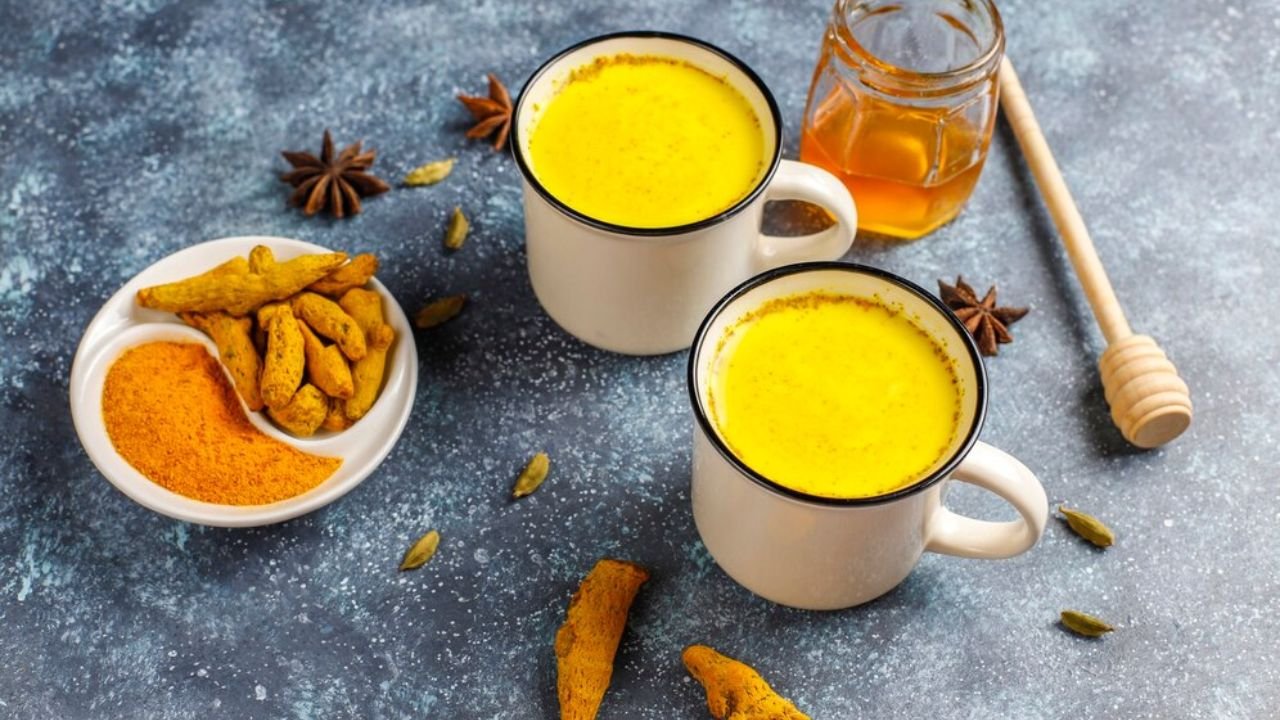
What’s in Turmeric Tea?
The Benefits of Turmeric Tea
- Anti-inflammatory properties: Curcumin, found in turmeric, has powerful anti-inflammatory properties, which help reduce symptoms of inflammatory conditions like arthritis and inflammatory bowel disease.
- Antioxidant effect: Turmeric contains antioxidants that fight oxidative stress and protect cells from damage caused by free radicals. This potentially reduces the risk of diseases like cancer and heart disease.
- Boosts Immunity: Turmeric tea has immunity-boosting properties that strengthen the body’s defense mechanisms and enhance overall well-being by reducing susceptibility to infections.
- Supports digestive health: Turmeric tea stimulates bile production which aids digestion by reducing bloating and gas. It also reduces symptoms of indigestion and promotes gut health.
- Promotes Heart Health: Regular consumption of turmeric tea improves blood circulation, reduces cholesterol levels, and helps maintain heart health by reducing the risk of blood clots.
- Brain health: Curcumin has shown promising effects in supporting cognitive function and may potentially delay or prevent neurodegenerative diseases like Alzheimer’s.
- Relief from joint pain: People who suffer from joint pain and stiffness can get relief from turmeric tea. Because it has anti-inflammatory properties and is a natural alternative to traditional pain management.
Manage irritable bowel syndrome (IBS): People have used curcumin to treat digestive conditions for centuries. Many researches show that the antioxidant and anti-inflammatory properties present in it help in controlling intestinal bacteria.
However, more research is necessary in cases of IBS and other inflammatory bowel conditions, such as Crohn’s disease and ulcerative colitis.
Preparation of Turmeric Tea
- 1 teaspoon ground turmeric or 1 tablespoon ground fresh turmeric
- 1-2 cups water
- a pinch of black pepper (optional)
- Honey, lemon, or ginger as per taste
- Bring water to a boil in a small saucepan.
- When the water boils, add ground or grated turmeric to it.
- Lower the heat and let the mixture simmer for 10 minutes to extract the flavor and beneficial compounds of the turmeric.
- After this, you can just filter this tea using a fine mesh strainer.
- You can add some black pepper to it for better absorption of curcumin. You can add honey, lemon, or ginger as your taste prefers.
- Now enjoy your tea.
Potential Side Effects and Precautions
Although turmeric tea offers many health benefits, caution is necessary in certain circumstances:
- Stains: Turmeric has a vibrant yellow-orange color that can stain fabrics. Use caution when handling turmeric to avoid staining.
- Interactions with medications: It may interact with blood thinners, diabetes medications, or medications that reduce stomach acid. Therefore, a healthcare provider must be consulted before using it.
- Allergic reactions: Some individuals may be allergic to turmeric, experiencing symptoms such as rash, itching, or difficulty breathing. Therefore, if an allergic reaction occurs, stop using it.
- Digestive troubles: In some cases, high doses of turmeric can cause digestive troubles like nausea or diarrhea. So start with small amounts and keep an eye on your body’s reaction.
Turmeric Tea Variations
- Turmeric Ginger Tea: Combines the anti-inflammatory properties of ginger with turmeric for a soothing and aromatic blend.
- Turmeric Latte: A creamy and delicious version can be made by adding milk to turmeric tea. You can sweeten it with honey or maple syrup.
- Golden Milk: Spices like cinnamon, cardamom, and cloves can be added to turmeric tea which provides a warm and relaxing drink.
Conclusion
Turmeric tea is a testament to nature’s profound healing abilities, offering a pleasant blend of taste and health. It is known for its anti-inflammatory properties and antioxidant benefits. By incorporating this golden tonic into your daily routine with caution and moderation, you can begin the journey toward increased vitality and well-being.
Remember, before starting any new wellness regimen, it’s always best to consult with a healthcare professional to ensure it is suitable for your specific needs and circumstances.
Generally, it is safe to drink turmeric tea in limited quantities daily, i.e. 1-2 cups per day. However, several factors are important to consider such as:
- Personal Health: If you have any pre-existing medical conditions, are pregnant, breastfeeding, or taking medications, consult your doctor before consuming this tea.
- Possible Interactions: Turmeric may interact with certain medications, such as blood thinners.
- Dosage: Generally safe for everyone, however, taking it in excess may cause side effects.
There is no one way to drink this tea, but here are some suggestions:
- Increase absorption: Add black pepper or a healthy fat like coconut oil or milk to your tea. It helps your body absorb curcumin, a beneficial compound present in turmeric.
- Taste: You can also add spices like ginger, honey, lemon, or cinnamon to enhance its Taste.
- Temperature: Although boiling does not destroy its nutrients, some of its nutrients remain safe by boiling or soaking at low temperatures.
Boiling reduces the amount of curcumin in turmeric tea slightly. However, its effects may be minimal but other beneficial compounds remain. Keeping it at lower temperatures for longer periods preserves more curcumin.
In most cases, turmeric tea is well tolerated. But its high doses can lead to many possible side effects such as:
- Stomach upset, heartburn, or diarrhea
- Increased risk of bleeding (when taking blood-thinning medications)
- Gallbladder problems (if you have existing problems)
If you experience any side effects, be sure to consult your doctor.
There is no scientific evidence to support the claim that turmeric tea “cleanses” the body. Although it may provide some potential health benefits, the concept of “cleansing” is not medically recognized.